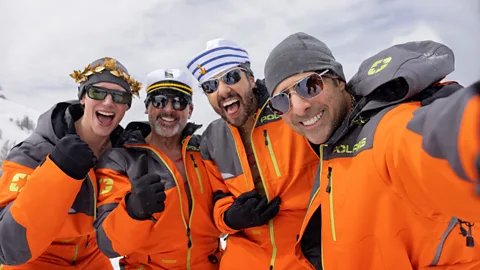Mountainhead review: Succession creator's nightmare vision of a world run by billionaire tech bros
 Fred Hayes/ HBO
Fred Hayes/ HBOSuccession showrunner Jesse Armstrong's dystopian feature film debut, premiering on HBO, has "timely resonance" in this "high-tech moment".
What if tech bros ruled the world? What if they already do? Jesse Armstrong's close-to-reality satire, Mountainhead, exposes that thin line between those actually holding government power and those pulling the strings behind it. It is the first film directed as well as written by the creator of Succession, and offers a reminder that before that brilliant drama about power, capitalism and family dysfunction, he was a writer on pointed political comedies including The Thick of It and the film In the Loop. Mountainhead, directed with a smooth confidence that shows Armstrong's experience, moves deftly from a satiric drama in its first half to absurdist black comedy in the second.
It focuses on four tycoons, good friends on the surface but cutthroat underneath, who gather for a poker weekend at the luxurious home of the poorest of them, the one who is only worth half a billion dollars. Where Succession took a long view of power and media manipulation, Mountainhead is made to have timely resonance in this high-tech moment. Armstrong only began shooting the film in March and here it is.
Armstrong has brilliantly cast those four characters, who all have agendas for the weekend and try to hide them from each other. Jason Schwartzman is Hugo, the host and creator of a meditation app, angling to get one of his friends to invest a billion or so in his business. Steve Carell is Randy, whose contacts in Washington, DC can influence the military and the country's power grid. Diagnosed with incurable cancer, he can't believe money can't fix that, but hopes to cheat death by getting his friends to create an artificial intelligence able to upload a human brain. Ramy Youssef is Jeff, whose company has a superefficient AI, and who appears to be the most humane of the four (which isn't saying much). But the most striking character is Ven (Cory Michael Smith), the owner of a social media app called Traan. Together they are an amalgam of tech tycoons such as Jeff Bezos and Mark Zuckerberg. But Ven pointedly and unmistakably evokes Elon Musk, however different Smith's look and manner. Ven is the world's richest man, who owns a social media platform that reaches four billion users and who gets a phone call from the US president (unnamed and unheard) while at Hugo's. The quick turnaround allows the film to be up-to-the-minute, even if it never explicitly mentions actual people.
The fictional plot extrapolates a nightmare version of where a consolidation of billionaires' control might lead, in a world where social media has overtaken journalism and run amok. Even before the men arrive for the weekend, we hear news reports of global conflicts set off by misinformation and deep fakes on Traan – an assassination in France, a lethal fire set in India, migrants being targeted in Libya. The economies of Latin American countries start crumbling. Isolated at their mountaintop retreat in Utah, literally positioned above it all, the tech bros doomscroll these dystopian events and see an opportunity to gain even more wealth and power.
The men arrive on their private jets, but the film quickly settles into one setting, Hugo's enormous, sterile-looking glass-walled house. We are immersed in their cringey friendship, as they throw supposedly mock insults at each other, following up any caustic remark that actually hits a nerve with "I'm just razzing." Armstrong keeps the camera and the dialogue moving fast, so the single setting and small cast never feel claustrophobic.
All the actors make their outsized, unlikable characters believably awful. Schwartzman frequently plays hangdog characters, which is useful here as we instantly intuit that Hugo's bravado masks his insecurity. As always, Carell impressively turns from comedy to drama in a flash, and his line deliveries are supersharp. Armstrong has given him some of the film's most memorable dialogue. After Ven takes his call from the White House, which is not happy with the world disorder, Randy says, "The president's a really nice guy and a friend but he's…" and Carell takes a before going on: "he's a simpleton." Underlining the bros' arrogant but not unrealistic sense of their own importance, he adds: "It doesn't matter what he says. It matters what we say." Youssef’s ever-sincere expression is perfect for Jeff, who actually thinks it might be possible to cooperate with the government. And Smith's depiction of Ven is just right, all sharp edges and social cluelessness.
The first half's tone is one of droll wit rather than laughter, and it's absorbing but also a bit obvious. But halfway through, a shift in tone is signalled by a brief, almost slapstick scene in which Randy bumps into a glass door and leaps up off the floor. Three of the men begin to conspire against the fourth, and totally fumble carrying out their outlandish scheme, which shouldn't be spoiled here. This last half is livelier, with some laugh-out-loud moments that come from their ineptitude. But under the silliness and black humour we still see pure greed and ruthlessness. No wonder there's a dystopia taking shape below the mountain.
Mountainhead may seem to be an argument for fast-turnaround films, but few writers and directors could do it with Armstrong's sharp eye and intelligence, as he entertains us with these heartless, all-too-convincing megalomaniacs.
Mountainhead is released on HBO and Max on 31 May.
★★★★☆
--
If you liked this story, sign up for The Essential List newsletter – a handpicked selection of features, videos and can't-miss news, delivered to your inbox twice a week.
